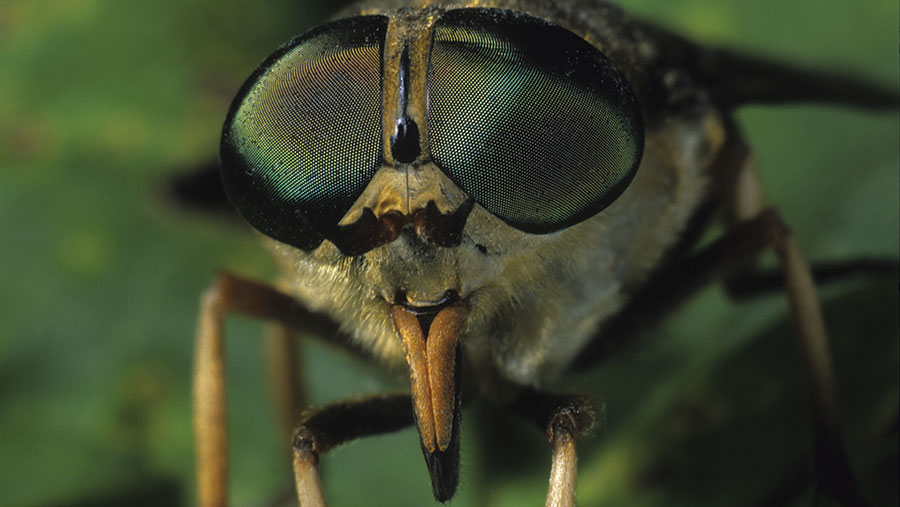How to protect your pig farm from flies
 © Hans Lang/ imageBROKER/Shutterstock
© Hans Lang/ imageBROKER/Shutterstock Flies can be a massive problem affecting indoor and outdoor pig units. Not only are they a nuisance that can lead to a reduction in feed intake, but they can also transmit disease.
We get advice on managing flies this season from pig vet Dimitrie Leonte of Garth Pig Vet Practice and AHDB Pork.
Why are pig units affected by flies?
Pig housing – both indoor and outdoor – provides ideal conditions for flies, as they can be a great source of food and warm, moist conditions. Indoor farrowing and nursery buildings in particular create ideal breeding sites.
See also: Common signs of illness in pigs and tips for treatment
What type of flies affect pigs?
The house fly is the most common species affecting pig farms. It can complete its lifecycle in as little as seven days and, if the conditions are right, can rapidly develop into large populations.
What problems do they cause?
Most flies on pig farms are vectors for several pathogens such as salmonella, E coli, porcine reproductive and respiratory syndrome (PRRS), flu, haemolytic streptococcus, worm eggs and some notifiable diseases.
Adult flies usually live for between one and two weeks, during which time they can spread pathogens around the farm. Because flies can travel distances of several miles, they can spread diseases between farms.
There is also the issue of fly worry when infested livestock are harassed. This can lead to a reduction in feed intakes, subsequent reduction in production and serious economic losses.
When do flies become a problem?
They usually become a problem as temperatures increase. However, fly populations can increase even when the ambient temperature is low, as manure and rotting material are much warmer and make ideal breeding sites.
It is better to get on top of any fly problems early, before numbers become intolerable, as adult flies only make up 15% of the total fly population.
How can you control flies?
To keep fly numbers at an acceptable level throughout the year, an integrated fly control programme is essential.
This centres on preventing and controlling flies using a whole range of measures – both management techniques and physical and chemical control.
It should take the form of a written document that staff can follow.
An effective programme should encompass the following:
- Set up an effective manure management strategy. Wet and dirty straw and other bedding material is a perfect fly breeding habitat, so remove at least twice each week to break the seven-day breeding cycle.
- Pay attention to areas where dirty material may collect, such as the corners and edges of pens and under feeders. Larvae are unable to survive in very liquid manure/slurry, but debris and floating mats will allow flies to breed in slurry stores.
- Constantly check the levels of manure under the slats and the pen’s corners, periodically draining or cleaning it.
- Cover carcass disposal sites to prevent fly access.
- Ensure good ventilation. Insufficient airflow results in condensation forming in houses. Within the constraints of the animals’ needs, as much airflow as possible should be maintained to promote moisture removal from manure and other fly breeding areas.
- Clean up spilled feed regularly.
- Keep vegetation surrounding pig buildings and yards under control.
- All-in, all-out management means empty buildings can be thoroughly cleaned and disinfected, eliminating the majority of insects and their breeding sites.
- Reduce the movement of equipment between buildings to reduce the risk of reinfestations.
- Use chemical controls:
* Adulticides can be used as baits, sprays, paints and mists. They can rapidly reduce high numbers of adult flies and will stop flies from laying more eggs and spreading bacteria and other pathogens around the farm.
*Larvicides will prevent larvae from developing into adult flies. As eggs and larvae make up a large percentage of the fly population, larvicides applied to breeding sites can significantly reduce the number of new adult flies emerging.
* It is important the same insecticides are not used intensively, as this can lead to resistance within as little as two years. To slow the development of resistance, it is advisable to rotate the chemicals used on the unit, choosing products that are based on different active ingredients. - Non-chemical control screens can be used alone or, more effectively, in conjunction with insecticides. However, it is important screens should not affect building ventilation.
- Predatory flies can be provided by companies such as Appifly, MS Schippers (BE) and LLM Vets (UK). This involves introducing parasitic flies on to the farm. The flies then inhibit the breeding population of nuisance flies.
